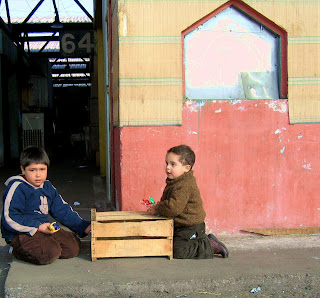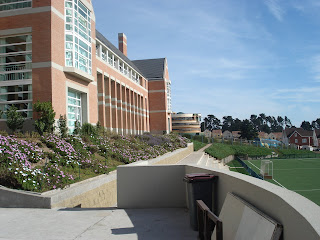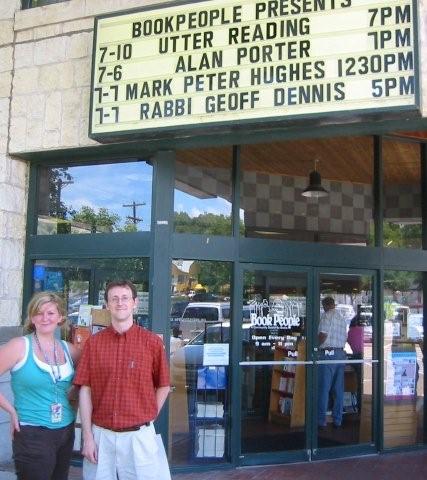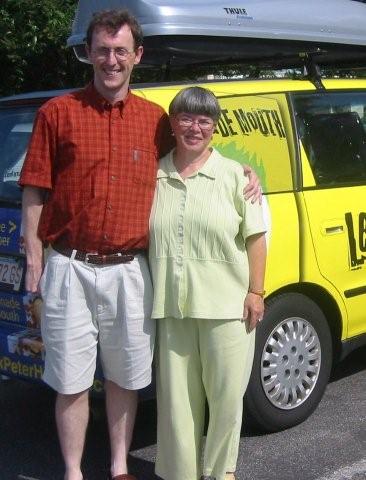 A year ago I sent out around thirty applications to various teaching positions in southern California to try to find work closer to where my mother lives. I heard back from two, one in Thermal, and the other, an administrative position in Indio. I think both places reached 127 degrees the summer of 2006.
A year ago I sent out around thirty applications to various teaching positions in southern California to try to find work closer to where my mother lives. I heard back from two, one in Thermal, and the other, an administrative position in Indio. I think both places reached 127 degrees the summer of 2006.
I'm far from fluent in Spanish, and I've been teaching a long time. Perhaps this is why I didn't get responses, but schools in Chile wanted me, and every school I visited welcomed my teaching skills with open arms.
Before I left, I researched several places and set up entrevistas. The first interview was at private school, Santiago College, which invited me back to teach a lesson in phonemic awareness to third graders. I also visited a fourth grade class and talked about California and my novel HUNGRY. I was given the Chilean hello upon my second visit, touching cheek to cheek with both the director, Sra. Farba, and the curriculum specialist whose name was Susanne, if I remember correctly. They were amazed that in California we teach EVERYthing: art, music, p.e., on and on and on . . .
I followed this interview with another at the Universidad de San Sebastien, within walking distance from our hostel. On his trip to Chile earlier in the year, Bill had talked to Sra. Pichilaf, a professor there, and found out about the commitment the country has made to teaching English. American English, at that. I don't have a master's degree, but I do have over twenty years of teaching at Title One schools and two credentials. I was offered a job to teach writing, English, and reading pedagogy to university students enrolled in the education department. San Sebastien was the first of many brand new schools Bill and I saw. The students who go to it are from the public school system, and many are the first generation in their families to have an opportunity to get a degree.
We then visited with Mr. Donald Bergman, the director of Nido de Aguilas, the American International School in Santiago, considered to be one of the most prestigious in the country. The atmosphere of the office made me feel I was back home. Half of the students are Chileans, the rest are children of diplomats and foreign business people. As an international school, representatives come to various hiring fairs in the United States. There is one in San Francisco in the spring. It's important to know that to receive a higher salary, you should be hired at one of these fairs. If I chose to work at Nido, I'd go to the San Francisco fair and make the job official this way.
I work with a Chileana, my good friend, Veronica McGee. She suggested we go to Lincoln International School, as she worked there in the 1970s. We mentioned her name to the director, Mr. Seaquist, and a big grin spread across his face. Veronica had been his teacher! Mr. Seaquist offered Bill and I both positions, starting whenever we could move to Santiago. Lincoln is a small school, which I liked a lot. Students are taught in English through the 6th grade (maybe the 8th? can't remember), and then they are taught in Spanish. I found this to be a common practice, as students need to pass the national exams to be able to graduate. St. Margaret's British School for Girls is in Concon, a couple hours north of Santiago near the city of Vina Del Mar. (I apologize for writing "n".) I felt like I had walked into a spa. The school is bright and shiny and new. Every classroom has a view of the ocean. In emails to friends, I compared the view to that of Fort Ross on the northern California coast. The director, Sra. Avril Cooper, was warm and was thrilled when she found out I was Anglican. The student population consists of all girls, from kindergarten to 12th grade. The school is committed to the International Baccalaureate Program and sends its teachers to England to be trained.
St. Margaret's British School for Girls is in Concon, a couple hours north of Santiago near the city of Vina Del Mar. (I apologize for writing "n".) I felt like I had walked into a spa. The school is bright and shiny and new. Every classroom has a view of the ocean. In emails to friends, I compared the view to that of Fort Ross on the northern California coast. The director, Sra. Avril Cooper, was warm and was thrilled when she found out I was Anglican. The student population consists of all girls, from kindergarten to 12th grade. The school is committed to the International Baccalaureate Program and sends its teachers to England to be trained.
The last school I went to was a complete surprise. Seven hours north of Santiago are the sister cities of La Serena and Coquimbo, which I plan to write more about. In Coquimbo, however, Bill was walking around in a stunning area that looked like Joshua Tree by the sea: beautiful boulders rolling down to crashing waves. In the U.S., this place would have been gobbled up by millionaires long ago, but it's one of the poorest places in Chile. Here, he found a brand new school which looked very much like St. Margaret's with the same panoramic view of the Pacific. He thought it was a private school. I went back with him the next day, and the welcome we got, two Americans just wandering in, was one of the most amazing experiences of our lives.
The school's name is Juan Pablo Segundo, but even though it's named for a pope, it's a public school. The Chilean government has spent three million dollars on new schools for the area. I brought my resume along, just in case. We told Verela, the English teacher at Juan Pablo, that we were visiting Chile and were considering moving to the country. She told us I could start work immediately if I wanted to!
Many of the children at the school are descendants of English pirates, the corsarios, who with Francis Drake used Coquimbo as a port to raid Spanish Galleons. There were many children with fair skin and freckles. Juan Pablo Segundo is two years old, and this is the first time the children had even gone to school. The first thing they had to learn was how to use a bathroom, as they used the Joshua Tree like rocks around their homes before. The teachers are highly dedicated. They say that the kids can be challenging at times, but that they are sweet. They and their families are incredibly happy to have the gift of education finally given to them.
We were invited to come back for a tea, a celebration for the three students with the highest grade in each class. While we waited, the president of the school, a charming 7th grade girl welcomed us in her very best English, while other students huddled around with pretend microphones as though she were interviewing us for television. The tea was delicious, along with sandwiches and cake, and we were told to go to the Education Department in town and drop off another resume. We did this the next day, and I'm proud to say our Spanish was good enough to get us pass the security guard and to communicate with a secretary about why we were there.
So many opportunities boggled us. We're still sorting things out. Coquimbo has its charms, and it's cheaper than Santiago. In La Serena, we found lunches for $1.60, where comparable lunches in Santiago were around $3-$5 dollars. I love being near the ocean, and Coquimbo/La Serana offer this option. Santiago, though, offers more varied opportunities, closer to the airport for trips back home, and living in a city would be so different from our life in rural northern California. We go back and forth and back again, able to imagine an array of permutations for our future.
Then . . .
On our last day, Bill and I were making last minute shopping choices (and, boy, do I wish I brought home more sweaters, scarfs, and shawls to give as presents). We were standing next to a stall with mugs with Allende and Pinochet's faces on them. Mugs on mugs, I guess. The vendor was putting her finger to her throat, indicating what Pinochet did to Allende, and Bill made a comment about how, perhaps, Pinochet's portrait should be on a chamber pot. He started talking to a gentleman standing nearby who laughed heartily at the joke.
Mr. Mattus is an epidemiologist who works at the World Bank in New York. His wife is the Chilean ambassador to Peru. He found out that I taught, took my name, and gave it to a friend who is a professor at the Preuniversitario de Chile, a feeder school to the Universidad de Chile. Yesterday I received an email and was offered a position to teach IMMEDIATELY!
Ahhhhhh!!!!! We have to sell the house in a depressed housing market. We have three dogs. I have to focus on writing, and school will start again here in California before I know it. But I think Chile is calling us, and in a year, we may be there.
Viewing: Blog Posts Tagged with: teaching opportunities in Chile, Most Recent at Top [Help]
Results 1 - 3 of 3
Blog: Alethea Eason (Login to Add to MyJacketFlap)
JacketFlap tags: HUNGRY, travel in Chile, teaching opportunities in Chile, HUNGRY, travel in Chile, teaching opportunities in Chile, Add a tag
Blog: Alethea Eason (Login to Add to MyJacketFlap)
JacketFlap tags: HUNGRY, travel in Chile, teaching opportunities in Chile, HUNGRY, travel in Chile, teaching opportunities in Chile, Add a tag
.jpg) In America, airports screen for terrorists, but when we arrived in Chile, our luggage had to be x-rayed in case we were smuggling in cheese. So, on top of my list for moving there is the lack of fear and threat. I don't believe that Chile is anyone's enemy right now, though I heard that Bolivia is still upset about losing their coastline during the guano wars in the 1800s.
In America, airports screen for terrorists, but when we arrived in Chile, our luggage had to be x-rayed in case we were smuggling in cheese. So, on top of my list for moving there is the lack of fear and threat. I don't believe that Chile is anyone's enemy right now, though I heard that Bolivia is still upset about losing their coastline during the guano wars in the 1800s.
I've been home for three days, reveling in the green of summer, the order and luxury of the United States. Ah, warm water in sinks and plenty of toilet paper. But spending a month in South America was heavenly, and it is increasingly looking as though we're destined to be there.
I could forget about the war for awhile, be touched by the kindness of the people we met, wooed by the romance of the neo-colonial architecture, and overwhelmed with options offered to me as a teacher.
I'd hoped to blog, but computers were busy in hostels, always with someone else waiting for their turn. Dealing with a Spanish keyboard and needing to write fast made me decide to wait until I came home. Speaking of writing, as in fiction projects, I didn't do that either. I brought an Alphasmart with me, a small lightweight word processor, but I found that it didn't cut and paste. I can barely write a sentence before I'm rewriting. The three or four times I sat down to work, things didn't flow.
Hostels in winter evenings are cold. Few people in Chile have heat beyond kerosene. There's no natural gas in the country, and South America has been experiencing the coldest winter in 90 years. Also, good light was hard to find in the evenings, and my eyes need it.
Excuses, excuses.
The day before I left, I worked with my writing partner Mary Benson on the plot for STARVED. I told her I'd be happy if I brought back 30 pages. Well . . . my subconscious usually solves manuscript challenges if I leave things alone for awhile; perhaps letting go of the pressure to write the second novel that I need to write was a good thing.
I did read A LOT, something I often don't find time for. Five novels, which were like candy: The Subtle Knife and The Amber Spyglass by Phillip Pullman which pulled at my heart and kept me thinking, the first Sally Lockhart mystery also by Pullman, Ann Rice's Jesus the Christ, and Pharaoh by Karen Essex, wonderful to read on frigid days in July. Snowmen on the July pages of calendars might be something I never get used to.
The picture above was one of my favorite places in Santiago, a historic square near our hostel, La Casa Roja. La Casa Roja run by an ex-pat Aussie named Simon, has the reputation of being the best one in Chile, and comes with a Dalmation named Dado who has his own couch.
I freaked when I got there, though, mostly due to travel fatigue. So many people were smoking, the area around the hostel didn't look safe (although I saw hundreds of university students and women walking alone), and I realized that I wasn't going to be warm for a month. Needless to say, I got over it, and by the time I left Bario Brasil felt like home.
Blog: Lemonade Mouth Across America! Blog (Login to Add to MyJacketFlap)
JacketFlap tags: church ladies, frank, petey, jonathan, bryan, beverly, pettine, austin, stephan, finger, pat, sopapillas, francesco, animals, jonathan, church ladies, frank, petey, bryan, beverly, pettine, austin, stephan, finger, pat, sopapillas, francesco, Add a tag
MARK: Today I had help from Lucy, age 8, with today’s update. I asked her to talk about our stays in Bryan and Austin, TX while I typed what she said. Full disclosure – I took what she said and changed the order of some sentences so that it goes in chronological order. Otherwise, though, this is what she said. Her comments are in the larger font.
LUCY: When we came into Texas, we were listening to a song named "After Breakfast Let’s Go to Texas.” My mom and dad are in a band that’s called the Church Ladies and it's their song.
We went to Bryan, Texas and stayed with Petey, my mom’s friend. Petey is a really nice man. We walked around Texas A and M. It was really hot out and I liked it a lot. Petey told us about butterflies and Texas Rangers and trees. 

MARK: For the Texas A&M football team, there is great importance given to "The Twelveth Man." Here's Karen with her hand on the thigh of that hallowed player.
Also, in Bryan we finally got our antenna fixed! Yay! Here's a picture with Daniel from the Honda dealer. Such a nice guy!
LUCY: We went to a restaurant. It was my dad’s birthday. It was a Mexican restaurant and I tried Sopapillas and I loved them. In the Sopapillas we put a candle and sang Happy Birthday to my dad. 
Another day we went to Aunt Pat and Uncle Frank’s house in Austin, Texas. We saw Suzanne and Stephen my second cousins and Francesco, which is a baby, my new cousin. Francesco was 3 months old when I met him. He was really cute. I love the way that he holded on to my finger.
MARK: Here's Zoe with lovely Francesco, and then my family: 

MARK: While we were at in Austin, Lucy decided to play with my aunt’s weight set and promptly dropped a 5lb weight hard on her left ring finger. It then proceeded to turn purple and swell up. It’s still purple and swelled, but a bit better now. And she can move it around, so we’ve decided it must be okay. Yet another adventure with Lucy.
(I have a picture of Lucy's finger but Karen seems to have hidden the camera and she's asleep right now -- the nerve! -- so I can't download it. But I'll put it up here soon)
LUCY: We went to lots of bookstores and me and Zoe got these little stuffed animals and my brother got a hat. We went in the kids section and played with the trains. 
MARK: We loved the beautiful state capital building -- where we arrived just in time for an amazing tour. And we remembered the Alamo... 

We visited an amazing independent bookstore in Autsin called Book People. They were very kind to us! 
At a Barnes and Noble in Austin we had an unlikely encounter too strange for fiction: I was standing there talking with a bookseller when I heard a woman’s voice behind me say, “Mark? Mark Hughes, is that you?” I turned around and there, out of the blue, stood a familiar face from Rhode Island. Beverly Pettine is a friend of the family who used to work with my mother. Beverly doesn’t live down here in Texas--it was just a strange coincidence that she just happened to be visiting her sister in Austin (who knew?) and just happened to be in exactly the right the bookstore with her sister and niece when she saw a sign announcing that I was going to be appearing here. She looked at the time and my appearance just happened to be exactly when she was here. If I were to put that in a story, no one would believe it. Yet, here’s the proof: Here I am with Beverly in front of our car in Austin, TX, of all places. Whoda thunk? :-) 
We also had a very nice afternoon with friends of friends. Our neighbor, Jay, grew up in the Dallas area so we were very pleased to meet Brad, Holly, Katie, and Grace, who live in Austin. Lovely people and our new friends in Texas. :-) 
LUCY: Yesterday we went to Stephen and Jonathan’s house and they have five dogs. Their names were Max, Casey, Billy, Toby, and Lloyd. They were cute. I loved to pick Max up. He was the littlest but he was 31 years old. We went in Stephen and Jonathan’s pool and swam. Stephen and my dad and mom threw us in. It was really fun.
Right now my brother and sister are filling their stomachs with Cheetos. We’re driving to Dallas, Texas. We’re going to stay with Gigi. We were just listening to High School Musical in the car.
MARK: A sad note: I just got some terribly disappointing news from NPR – they are not going to air the road-trip stories after all. Given their already busy line up and the fact that the producer working with me will be away in Alaska for a month starting this week, they made their decision not to go forward with the road-trip stories. I can’t tell you how disappointed I am about this. I sent out the message about NPRs decision earlier this morning and was truly touched by the many, many the kind emails people sent in reply. I’m grateful to have such a supportive network.
On the other hand, I’ve already learned a great deal from working with NPR so far, and the experience has been a lot of fun. Perhaps after the summer is over I’ll submit some commentaries in the style of the first one, where I talked about quitting my job. We’ll see.
In any case, this is so far the only significant set-back in an otherwise successful and happy road trip/book tour. And I’m determined to get over it before we reach Dallas. :-)
I appreciate your friendship.
-- Mark
LEMONADE MOUTH (Delacorte Press, 2007)
I AM THE WALLPAPER (Delacorte Press, 2005)
www.markpeterhughes.com


